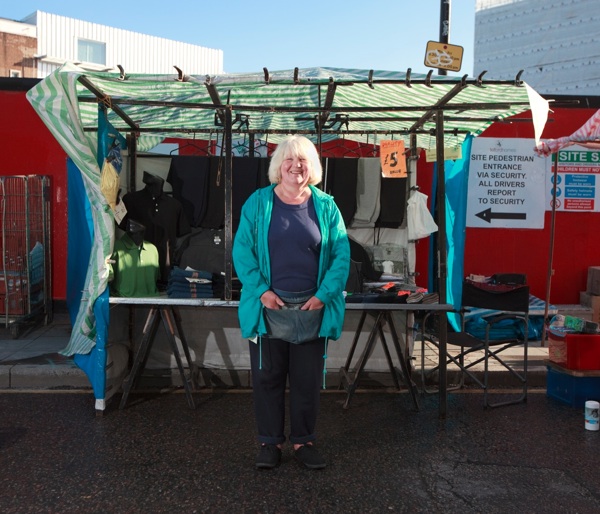Brick Lane Market 11
Patricia Green told me her father Ronald began selling menswear from this pitch when he obtained a licence in 1956 – although the family were in Sclater St long before that, when it was an animal market.
“Originally his father used to be down here selling birds,” explained Patricia, “and my father used to sell birdseed as a boy. He stayed until he was seventy-six, and was down here until a few weeks before he died.” Leaving school at fourteen, Ronald worked in a pawnbrokers and then a department store, before opening his own shop, selling menswear in Upton Park and on Sclater St each Sunday. “I started coming down here to the market with him when I was five years old,” admitted Patricia fondly, casting her eyes along the street to see the invisible crowds of long ago,“there were so many people you couldn’t walk through it, you just got carried along with the crowd. You never used to see any women, it was a men’s market – maybe one in fifty was a woman.”
“I don’t go to bed on Saturday night,” she explained with a grin of extraordinary vitality,“I just sit on the bed and maybe have forty winks, before I get up at ten past one to make the sandwiches and flask of tea. I get here around three o’clock and by the time I have set up and unloaded all the stuff it’s quarter to five, then at six o’clock I go and have a little chat with my friends.” It is a routine that few would choose, yet even though she is retired Patricia is keen to come every week. “I have regular customers and I know a lot of people who’ve been here for years – but every now and again someone disappears.” she confessed in a diplomatic whisper.
At the next stall is Patricia’s brother Robert Green, who helps out his friend Simon Lynch selling household goods. “I’ve been here since 1977, when I left school and started working alongside my father, “ he declared in triumph, “In forty years, I have only missed five Sundays – that was when I broke my leg and had to take five weeks off.”
When Robert reached fifty, he and his sister sold their father’s shop.“We used to work seven days,” he said, “Since I left school, my entire life had been the business and I wanted to have more time, but to tell you the truth I don’t have any more time than I had before.” – shaking his head in good-humoured perplexity. “After all these years, I still try to serve someone enthusiastically,” he informed me, raising a hand as a point of honour, “even if they are only buying a bottle of washing up liquid and, even though I don’t need the money, I treat them with as much respect as if they were buying a hundred pounds worth of stock years ago.”
With the ease of one who is at home in the world, Robert has an innate sense of decency and delight in what he does. “I hope to make money – but it doesn’t really matter, because I’ve always done it so I’d feel out of place if I didn’t do it. I am used to being down here at three in the morning in the freezing cold every week” he said, declaring both his own nature and affection for the market.“It’s a combination of things, tradition, culture and a lot of history – this is a very old market here.”
I stood at Robert’s side as eager customers paid for their purchases and he continued talking over his shoulder animatedly.“It’s tradition, because because years ago everything else used to shut and this was the only place open on a Sunday.” he told me, “It’s culture because there’s a lot of people on the other pitches who, even if we are not exactly friends, they always come and tell me what they are doing. And it’s history because some of the customers, I remember when they were young and now they are in their seventies and eighties. We’ve all grown old together. There’s a lot more to it than just coming down here to sell a few things.”
Photographs copyright © Jeremy Freedman


















I love your blog – and send some entries on to my parents too!